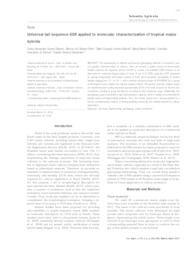Universal tail sequence-SSR applied to molecular characterization of tropical maize hybrids.
Universal tail sequence-SSR applied to molecular characterization of tropical maize hybrids.
Autoria: RIBEIRO, C. A. G.; PINTO, M. de O.; MACIEL, T. E. F.; PASTINA, M. M.; GOMES, E. G. de; GUIMARAES, C. T.
Resumo: The development of efficient and low-cost genotyping methods is essential to precise genetic characterization of cultivars. Here, we present a system based on fluorescently labeled universal tail sequence primers (UTSP) to resolve microsatellite (SSR) markers as an alternative for molecular fingerprinting of maize. A set of 20 SSRs using the UTSP presented an average polymorphic information content of 0.84, which provided a probability of random identity ranging from 10−7 to 10−14, and a minimum exclusion power of 99.99998 % in a group of 48 tropical maize single-cross hybrids traded in Brazil. The genetic diversity analysis based on multidimensional scaling explained approximately 28 % of the total variance for the first two coordinates, tending to group the hybrids according to their respective origin. Additionally, this genotyping system presented a high distinctiveness capacity, which is widely recommended for genetic purity and fingerprinting analyses. Thus, this marker system has a strong potential as a tool for complementary analysis of distinguishability, uniformity and stability required for cultivar registration.
Ano de publicação: 2017
Tipo de publicação: Artigo de periódico
Unidade: Embrapa Milho e Sorgo
Palavras-chave: Caracterização genética, Genotipagem, Variedade, Zea mays
Observações
1 - Por padrão são exibidas publicações dos últimos 20 anos. Para encontrar publicações mais antigas, configure o filtro ano de publicação, colocando o ano a partir do qual você deseja encontrar publicações. O filtro está na coluna da esquerda na busca acima.
2 - Para ler algumas publicações da Embrapa (apenas as que estão em formato ePub), é necessário ter, no celular ou computador, um desses softwares gratuitos. Sistemas Android: Google Play Livros; IOS: iBooks; Windows e Linux: software Calibre.
Acesse outras publicações
Acesse a Base de Dados da Pesquisa Agropecuária (BDPA) para consultar o acervo completo das bibliotecas da Embrapa.

